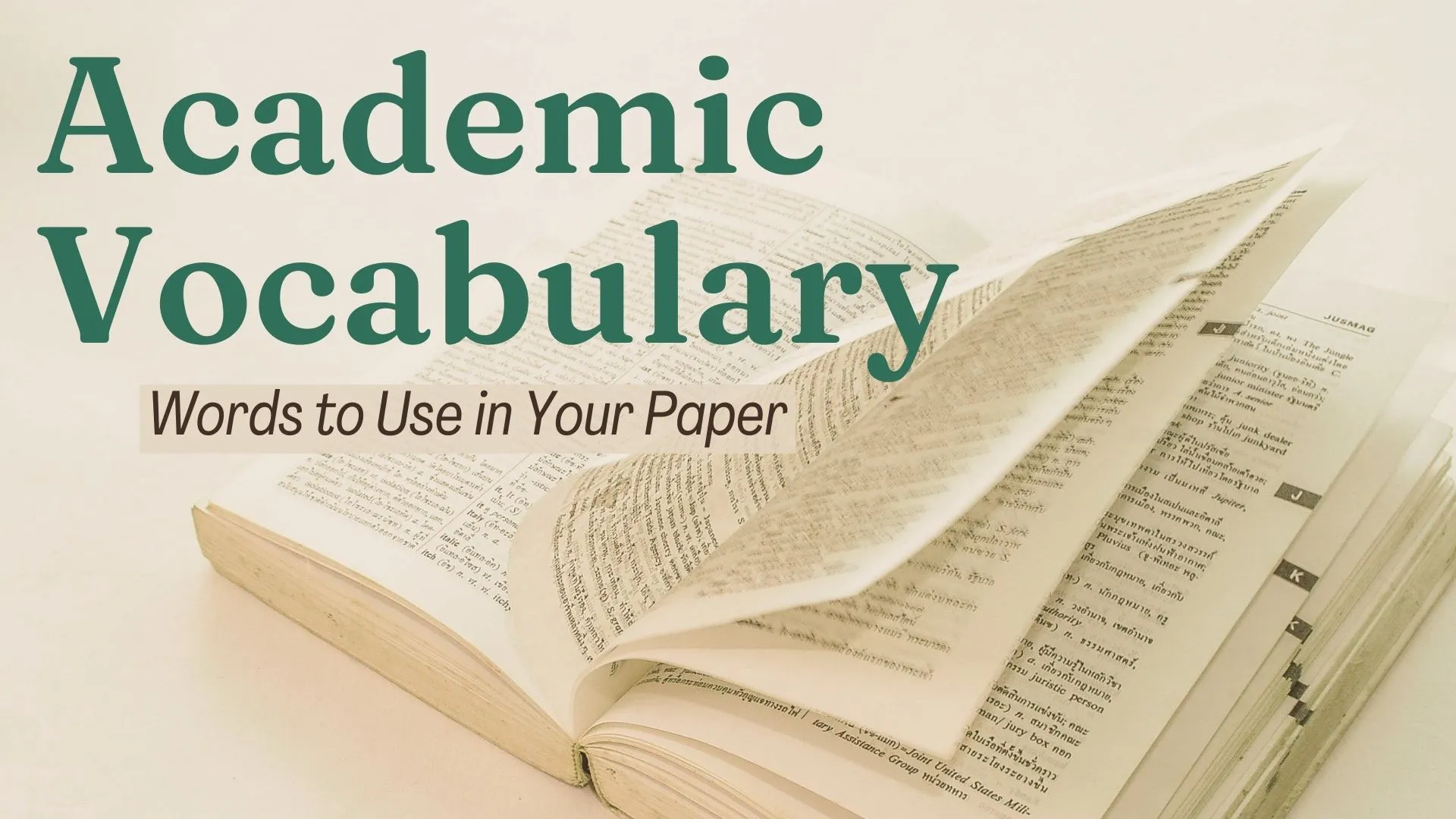Academic Vocabulary: Essential Words and Phrases to Elevate Your Essays
Are you tired of struggling to find the right words to articulate your thoughts in your academic essays? Do you want to take your writing to the next level and impress your professors with your command of language? Look no further! This article will explore the world of academic vocabulary and introduce you to a curated list of essential words and phrases that will elevate your essays to new heights.
A solid vocabulary is crucial in expressing your ideas with clarity and precision, from persuasive arguments to critical analysis. Not only will this help you stand out among your peers, but it will also enable you to communicate your thoughts effectively in any academic setting. So, whether you are a student looking to improve your writing skills or a professional aiming to enhance your communication abilities, this guide will equip you with the tools you need to improve your essays and succeed in your academic journey. Get ready to unlock the power of words and transform your writing into a masterpiece!

Why is academic vocabulary essential in essays?
Academic vocabulary plays a crucial role in essays, allowing you to convey complex ideas and arguments. When writing an essay, you are expected to demonstrate a deep understanding of the subject matter, and using appropriate academic vocabulary is essential to showcase your knowledge. By incorporating specialized terms and phrases, you can demonstrate your familiarity with the topic and engage your readers. Moreover, academic vocabulary helps you communicate your thoughts effectively and express your ideas clearly and concisely. Whether you are writing a research paper, an argumentative essay, or a literary analysis, using academic vocabulary adds substance and credibility to your writing.
Using academic vocabulary in your essays demonstrates your ability to think critically and engage with scholarly discourse. It shows that you have taken the time to familiarize yourself with your field's key concepts and terminology and that you can articulate your ideas within the context of academic discourse. Employing academic vocabulary enhances your writing quality and allows you to participate in intellectual discussions and contribute to the academic community.
The benefits of using academic vocabulary
Using academic vocabulary in your essays offers several benefits. Firstly, it enhances the clarity and precision of your writing. Academic language gives you the tools to express complex ideas and arguments concisely and accurately. Using the appropriate terminology ensures that your readers understand your message and follow your train of thought. Moreover, academic vocabulary helps you avoid vague or ambiguous language, making your writing more credible and persuasive.
Secondly, incorporating academic vocabulary into your essays shows you have a strong command of the subject matter. It demonstrates that you have done your research and are familiar with your field's key concepts and theories. This not only impresses your professors but also adds credibility to your arguments. Using academic vocabulary, you can position yourself as an authoritative voice in your field and establish your expertise.
Lastly, academic vocabulary allows you to engage with the academic community and participate in scholarly conversations. By employing the language of academia, you can connect with other scholars and contribute to ongoing discussions in your field. This expands your knowledge and understanding and opens up opportunities for collaboration and networking. Academic vocabulary is the key to unlocking doors and establishing yourself as a respected member of the academic community.
Common challenges in mastering academic vocabulary
While academic vocabulary is crucial for effective essay writing, mastering it can be challenging. One common challenge is the sheer volume of specialized terms and phrases within each academic discipline. Each field has its jargon and terminology, and it can be overwhelming to familiarize yourself with all of them. Academic vocabulary often involves complex concepts and abstract ideas, which can be challenging to grasp and incorporate into your writing.
Another challenge is knowing when and how to use academic vocabulary appropriately. Overusing specialized terms and phrases can make your writing inaccessible and difficult to understand. On the other hand, underusing academic vocabulary may result in your writing needing more depth and sophistication. Striking the right balance between clarity and complexity is essential when using academic language in your essays.
Furthermore, non-native English speakers may need help in mastering academic vocabulary. English academic language can be particularly challenging due to its extensive vocabulary, idiomatic expressions, and complex grammar rules. However, with the right strategies and practice, anyone can overcome these challenges and improve their academic vocabulary.
Strategies for improving academic vocabulary
Improving your academic vocabulary requires a systematic approach and consistent practice. Here are some strategies to help you enhance your vocabulary skills:
- Read extensively: Reading is one of the most effective ways to expand your vocabulary. Read academic texts, including research papers, scholarly articles, and textbooks. Pay attention to the language used and note any unfamiliar words or phrases. Look up their meanings and try to incorporate them into your writing.
- Create a vocabulary list: Keep a notebook or a digital document to compile new words and phrases. Organize them by topic or subject area to make it easier to review and practice. Review your vocabulary list regularly and use the words in your writing to reinforce learning.
- Use context clues: When encountering unfamiliar words, try to understand their meanings from the context in which they are used. Look for clues in the surrounding sentences and paragraphs to help you infer the word's definition. This will help you understand the word in its specific context and improve your overall vocabulary comprehension.
- Use online resources: Numerous online resources are available to help you expand your academic vocabulary. Websites like Vocabulary.com, Quizlet, and Merriam-Webster offer vocabulary-building exercises, flashcards, and quizzes to help you practice and reinforce your learning. Take advantage of these resources to enhance your vocabulary skills.
- Practice active usage: Memorizing words is not enough; you must use them in your writing and speaking—practice incorporating new words and phrases into your essays, presentations, and discussions. The more you use academic vocabulary in context, the more natural it will become in your writing.
Remember, improving your academic vocabulary is a gradual process. Stay consistent and patient, and you will see progress over time. With each new word you learn, you are one step closer to becoming a master of academic language.
Essential academic vocabulary words and phrases
To help you get started, here is a list of essential academic vocabulary words and phrases that are commonly used in essays:
- Analyze: Examine in detail to uncover the underlying structure or meaning.
- Evaluate: Assess the strengths and weaknesses of an argument or idea.
- Critique: Provide detailed analysis and assessment of something, highlighting both positive and negative aspects.
- Contrast: Identify differences or distinctions between two or more things.
- Synthesize: Combine different ideas or information to create a new understanding.
- Hypothesize: Propose a tentative explanation or theory based on limited evidence.
- Cite: Refer to a source or authority to support an argument or claim.
- Empirical: Based on observation or experience rather than theory or speculation.
- Paradigm: A framework or model that guides understanding and interpretation.
- Discourse: A formal discussion or conversation on a particular topic.
- Corroborate: Confirm or support with additional evidence or testimony.
- Delineate: Describe or outline in detail, providing a clear and specific account.
- Elucidate: Make clear or explain in detail to enhance understanding.
- Exemplify: Provide examples or instances to illustrate a point or concept.
- Elicit: Draw out or evoke a response or reaction from someone.
These are just a few examples of academic vocabulary words and phrases that can enhance your essays. Use them as a starting point and continue to explore and add to your vocabulary repertoire.
Using academic vocabulary effectively in essays
Once you have expanded your academic vocabulary, the next step is to use it effectively in your essays. Here are some tips to help you incorporate academic language seamlessly into your writing:
- Context is key: Use academic vocabulary in a way appropriate to your essay's context and purpose. Consider the subject matter, audience, and tone of your writing when selecting and using academic vocabulary words and phrases.
- Provide definitions and explanations: When using specialized terms, provide concise definitions or proofs to ensure that your readers understand their meaning. This will help you avoid ambiguity or confusion and make your writing more accessible.
- Use academic vocabulary strategically: Instead of randomly sprinkling academic language throughout your essay, use it strategically to enhance your arguments and analysis. Identify key moments in your article where academic vocabulary can add depth and precision and incorporate it purposefully.
- Vary your vocabulary: Avoid repeatedly using the exact academic vocabulary words and phrases in your essay. Instead, strive for variety by using synonyms and related terms. This makes your writing more engaging and demonstrates a broader command of the subject matter.
- Proofread and edit: After writing your essay, take the time to proofread and edit for clarity and coherence. Please pay attention to academic vocabulary and ensure it is used correctly and effectively. Remove any unnecessary jargon or convoluted language that may hinder comprehension.
By following these guidelines, you can effectively integrate academic vocabulary into your essays and elevate your writing to a new level of sophistication and clarity.
Examples of essays with strong academic vocabulary
To demonstrate the power of academic vocabulary, let's examine two examples of essays – one without academic vocabulary and one with solid academic vocabulary:
Example 1 (Without academic vocabulary): The book was really interesting. The author wrote well and made good points. I liked it.
Example 2 (With academic vocabulary): The literary work proved to be captivating and thought-provoking. The author's eloquent prose skillfully conveyed profound insights, which resonated deeply with me. I was engrossed in the narrative, captivated by the author's astute observations and compelling arguments.
As you can see, the second example, using academic vocabulary, creates a more sophisticated and engaging reading experience. The writer effectively communicates their appreciation for the literary work by employing descriptive and precise language. This not only enhances the writer's credibility but also immerses the reader in the richness of the text.
Resources for expanding your academic vocabulary
Expanding your academic vocabulary is an ongoing process; numerous resources are available to help you. Here are a few recommended resources to consider:
- Dictionaries: Online dictionaries like Merriam-Webster, Oxford English Dictionary, and Cambridge Dictionary provide definitions, examples, and pronunciation guides for various words and phrases.
- Thesauruses: Thesaurus.com and Power Thesaurus offer synonyms, antonyms, and related terms to help you vary your vocabulary and avoid repetition.
- Academic Writing Guides: Books like "The Elements of Style" by William Strunk Jr. and E.B. White and "Writing Essays For Dummies" by Mary Page and Carrie Winstanley provides practical tips and guidance for improving your academic writing skills.
- Online Courses: Platforms like Coursera, edX, and Udemy offer online courses on academic writing and vocabulary development. These courses provide structured lessons and assignments help to you improve your skills at your own pace.
- Academic Journals and Articles: Reading academic journals and articles in your field of interest exposes you to specialized vocabulary and terminology. Pay attention to how authors use language to convey complex ideas and arguments.
Remember to use these resources as supplements to your reading and writing practice. Continuous exposure to academic success in college is key to developing a strong command of academic language.
Academic vocabulary exercises and practice
To further reinforce your learning, here are some exercises and practice activities you can try:
- Flashcards: Create flashcards with academic vocabulary words and their definitions. Review them regularly to reinforce your knowledge and understanding.
- Sentence completion: Write sentences using academic vocabulary words. Practice using the words in different contexts and sentence structures to enhance your familiarity and fluency.
- Essay writing: Write essays on various topics, incorporating academic vocabulary. Challenge yourself to use the words and phrases meaningfully and coherently.
- Discussion groups: Participate in discussion groups or online forums to engage in academic conversations. Practice using academic vocabulary to express your ideas and respond to others' arguments.
- Peer review: Exchange essays with classmates or colleagues and provide feedback on their use of academic vocabulary. This helps you practice evaluating academic writing and exposes you to different writing styles and approaches.
Regularly practicing these exercises and activities will make you more comfortable and confident in using academic vocabulary in your writing and communication.
Conclusion
An academic vocabulary is a powerful tool for improving your essays and communication skills. Incorporating specialized words and phrases allows you to express your ideas with clarity, precision, and credibility. Remember to read extensively, create a vocabulary list, practice active usage, and use online resources to expand your academic vocabulary. Additionally, use academic language strategically, provide definitions and explanations, and vary your tongue to effectively use it in your essays. With practice and dedication, you can master academic vocabulary and unlock the full potential of your writing. So, embrace the world of academic language, and watch as your essays soar to new heights of excellence. Happy writing!




